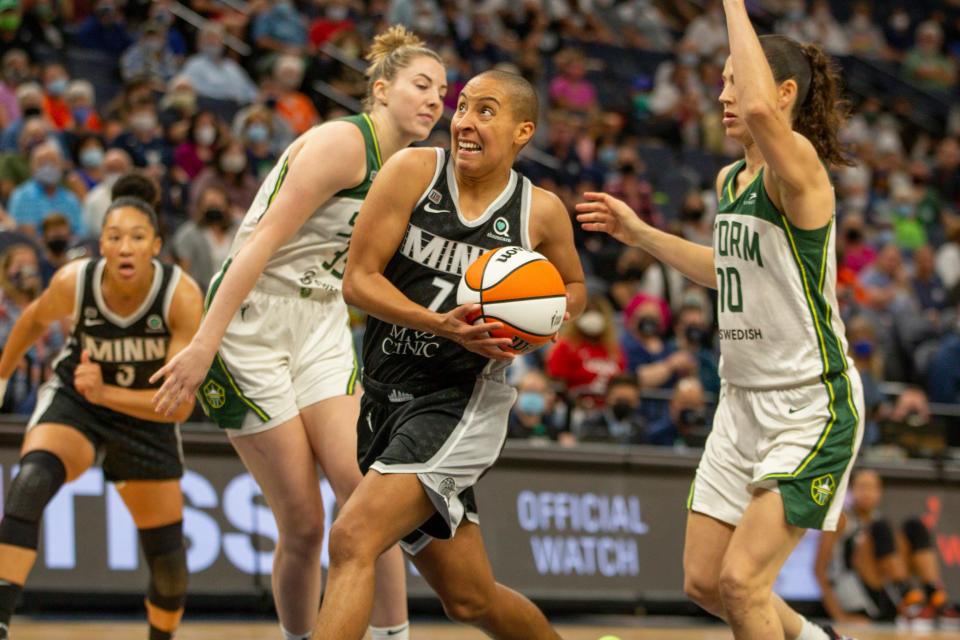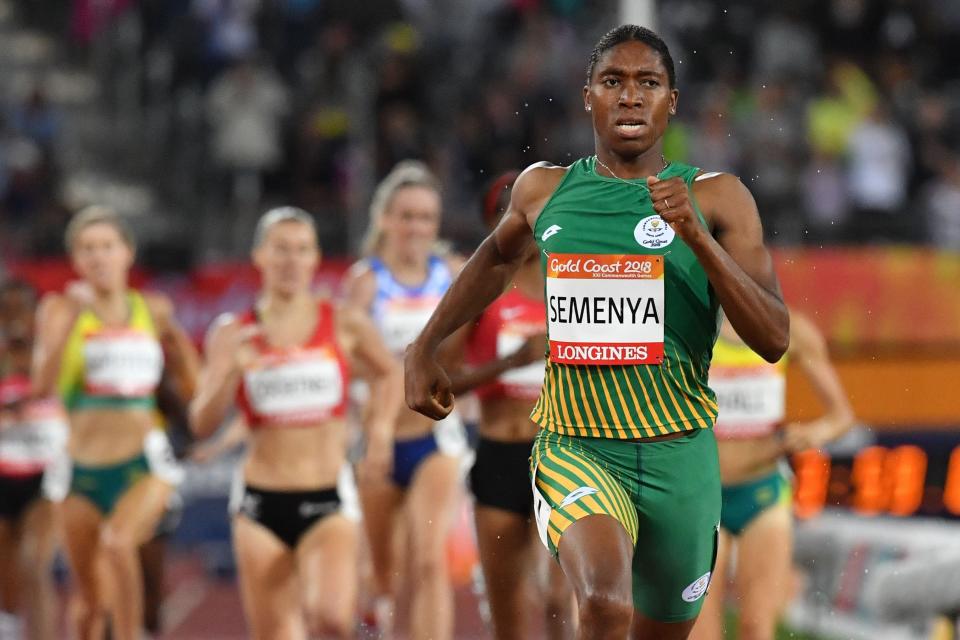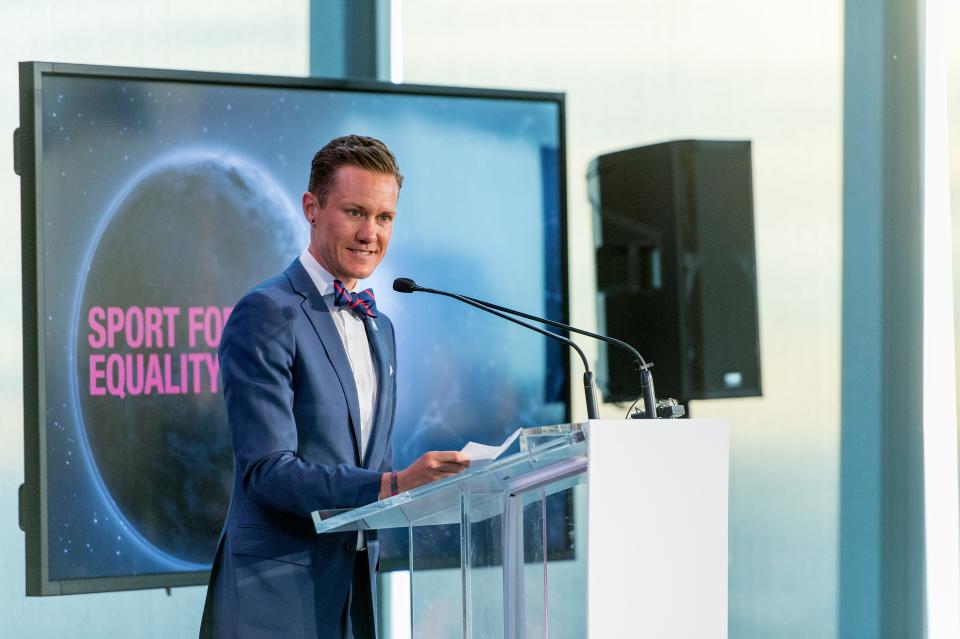American sports leagues struggle to create inclusive policies for transgender athletes
This has been a historic year for transgender athletes, though that history has seen two extremes.
Transgender athletes competed for the first time in the Olympic Games this year. Laurel Hubbard, a weightlifter from New Zealand, became the first openly trans woman to compete at the Games, and non-binary soccer player Quinn became the first openly transgender person to win an Olympic medal when Team Canada took gold. A few weeks later, Australia's Robyn Lambird took third in the women’s 100m T34 to become the first non-binary Paralympic medalist.
As these athletes thrived abroad, dozens of states in the U.S. introduced legislation banning trans girls and women from playing on teams that match their gender identity. Nine states have passed laws that restrict transgender inclusion at the middle school, high school and collegiate levels.
INVESTIGATION: Conservatives want to ban transgender athletes from girls sports. Their evidence is shaky.
While prep sports and elite sports have grappled with trans inclusion very differently, American professional leagues largely remain inactive on the issue.
There are currently no openly transgender athletes competing in any men's professional league in the U.S., and none of the leagues — the NFL, MLB, NBA, NHL or MLS — have an inclusion policy.
Three openly-transgender athletes compete on women's professional teams: Layshia Clarendon, who is non-binary, plays in the WNBA for the Minnesota Lynx; and Quinn and Kumi Yokoyama, who is a trans man, play for the National Women's Soccer League's OL Reign and Washington Spirit respectively. Harrison Browne, who played for the Buffalo Beauts in the National Women's Hockey League until 2018 (the league recently changed its name to the Premiere Hockey Federation), also played two seasons as an openly trans man, though Browne delayed his medical transition until he retired from women's hockey.
Of the three leagues that have included openly trans players, only the WNBA does not have an inclusion policy. The league has supported Clarendon through his coming out and transition, including after she underwent top surgery.

"We are so proud that Layshia is a part of the WNBA and we know that their voice and continued advocacy will not only support and help honor and uplift many other non-binary and transgender people, but also encourage empathy and understanding for the community across all levels of sport," said WNBA commissioner Cathy Engelbert in a statement after Clarendon's surgery.
The NWHL created its policy after Browne came out in 2016, and the league's official site lists an iteration from 2020 as the current standard. The policy states that anyone assigned female at birth (AFAB) is eligible to play in the league regardless of gender identity, but they are not permitted to undergo hormone replacement therapy while competing. Anyone assigned male at birth (AMAB) who wishes to play must demonstrate that their testosterone levels are within the "typical limits of women athletes."
The NWSL, which released its policy in March, establishes similar guidelines. Its policy also allows unlimited participation for AFAB individuals as long as they do not begin hormone replacement therapy, and it requires AMAB individuals to demonstrate that their testosterone levels are "within typical limits of women athletes," which the policy states is 10 nmol/L. The 10 nmol/L standard is also used by the International Olympic Committee.
"We did an awful lot of background reading," said Lisa Levine, the NWSL's general counsel who worked on the policy, to USA TODAY Sports. "We reviewed FIFA's as gender verification documents, the National Women's Hockey League policy...we we tried to do an awful lot of research to see what else was out there."
Testosterone has long been at the center of the debate around transgender inclusion. Anti-inclusion activists argue that higher testosterone levels give AMAB trans people a competitive advantage over people assigned female at birth.
However, there has been limited research on the quantitative competitive impact of testosterone, and the hormone occurs naturally at varying levels in most people, regardless of sex.
Policing testosterone levels has led to cisgender women being excluded from women's sports — multiple cisgender women were banned from competing in the Tokyo Olympics because World Athletics, the governing body for international track and field, set a level of natural testosterone that it deems an advantage.

“There is no solid evidence for the 10 nanomoles per liter for this regulation,” Katrina Karkazis, coauthor of the book Testosterone: An Unauthorized Biography, told Sports Illustrated in April. “It is an arbitrary threshold the IOC chose but cannot be explicitly tied to evidence of a performance difference based on T levels.”
The NWSL and NWHL both worked with the National Center for Lesbian Rights (NCLR) to create their inclusion policies. The NWSL specifically worked with Asaf Orr, the NCLR's Trans Youth Project director and senior staff attorney. Orr identifies as cisgender.
"We worked with our medical staff and worked with the [NCLR] and built into the policy that we're able to update it," Levine said. "For example, if medical advances come about, we're able to update the policy. If there are things that we find are either really working well or not working, we wanted the flexibility to be able to revise the policy as needed."
The NWSL's policy also gives any team or athlete in the league the right to challenge a transgender athletes eligibility to compete during the season. It states that challenges will only be accepted if they are "reasonable" and made in "good faith," but Levine said the league does not have specific standards for what constitutes such a challenge.
"We haven't actually had any challenges yet, and I hate to speculate on what might be good faith because that would also mean addressing what might be in bad faith," she said. "These are things that we would address on a case by case basis as they come in, but our overarching goal and the reason for putting together the policy...is to create a safe, non-discriminatory and inclusive environment."
Athletes Unlimited is a non-traditional professional league that sponsors women's softball, volleyball and lacrosse. The league developed its policy in coordination with Chris Mosier, a transgender rights advocate who was the first openly trans person to represent the U.S. in international competition.
Jon Patricof, the CEO and founder of Athletes Unlimited, said he is proud that his league's policy, while it does address the issue of testosterone and hormone replacement therapy, does not set any specific standard for "normal" levels.
"In order to be eligible, [AMAB] transgender athletes need to be undergoing hormonal treatment, but I do think that getting away from the measurement and identification of specific levels of hormones was something that I was particularly proud of," Patricof told USA TODAY Sports. "I thought that was something that I certainly learned a lot about during this process that we went through with Chris."

The Athletes Unlimited policy is the only policy in American professional sports that is endorsed by Mosier, though the NWHL said it is currently working with him to rewrite its policy ahead of the 2022 season.
"Athletes Unlimited’s policy prioritizes inclusion and privacy and allows an athlete to self-assess their own eligibility, without requiring invasive disclosure," Mosier said in a statement. "This policy is a huge step forward for professional sports, and I love that the leagues are player-driven, which means that this is the policy professional athletes approved to govern participation in their own leagues."
Patricof said that while Athletes Unlimited does not currently have any trans athletes competing, players were involved in the creation of the policy throughout the process. According to Levine, the NWSL player's union had the opportunity to read the league's policy but were not directly involved in its development.
Athletes Unlimited's policy is also the only one that currently includes non-binary athletes explicitly with guidelines specifically catered to them. Though the NWHL's new policy has not yet been released, Mosier's involvement makes it likely that it will include provisions for non-binary players.
"We're looking to create safe and inclusive spaces for everyone, and also maintaining competitive equity in professional sports," Patricof said. "It's really important that we're balancing inclusion with professional level competition, and being very respectful of people's privacy and human rights...we really want to be inclusive in a broad sense, and that was our design in terms of including both non binary and transgender athletes."
Contact Emily Adams at eaadams@gannett.com or on Twitter @eaadams6.
This article originally appeared on USA TODAY: Transgender athletes lack true inclusion in American pro sports

